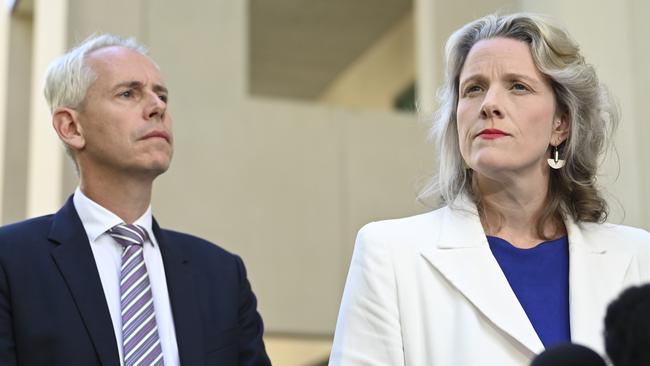Labor MPs join calls for Andrew Giles’ migration powers to be curbed
The latest intervention increases pressure on the Albanese government to change its emergency migration laws, which it has so far failed to convince the parliament to pass.

Five Labor MPs have joined with Coalition and independent colleagues to recommend a significant overhaul of the Albanese government’s controversial emergency migration laws, declaring Immigration Minister Andrew Giles’ proposed powers should be curtailed and mandatory minimum sentences abolished.
The Parliamentary Joint Committee on Human Rights, chaired by Labor’s Josh Burns, warned the bill – which the government failed to rush through the Senate last month as part of its response to the landmark NZYQ ruling overturning indefinite detention – was incompatible with, or limited, several human rights.
The 10-member committee, which comprises Labor, Coalition and independent MPs, said issues at stake included the rights to liberty and a fair trial; the rights to privacy and freedom of assembly, association and expression; the right to protection of the family; the rights of the child; the right to health; and the rights to equality and non-discrimination.
With the government eager to legislate its reforms as soon as May in a bid to pre-empt any ruling on the ASF17 High Court case, which could result in up to 200 non-citizens refusing deportation being released from immigration detention, the human rights committee made seven substantial recommendations to rewrite the Migration Amendment (Removal and Other Measures) Bill.
The committee said mandatory minimum sentences of one year for non-citizens who don’t comply with their deportation should be scrapped and it should be up to the courts – not the legislation – to decide whether a person had a “reasonable excuse” to refuse a direction from Mr Giles while he determined if they could be removed from Australia.
“The committee considers that mandatory minimum criminal penalties for non-compliance with such a direction are incompatible with the rights to liberty and to a fair trial, as mandatory sentencing removes judicial discretion to take into account all of the relevant circumstances of a particular case and may lead to the imposition of disproportionate or unduly harsh sentences of imprisonment (the appropriateness of which cannot be reviewed by a higher court),” the committee states.
Under the committee’s recommendations, Mr Giles would not be able to broaden the group of people who could be forced to leave Australia and would be more limited in what he could direct a person to do to assist with their deportation.
Mr Giles doubled down on the importance of the bill, saying it closed a loophole in the immigration system that had been left open by the Coalition.
“The people who this will affect are not citizens, and some of them are criminals,” his spokeswoman said.
“They have no legal grounds to stay here. The purpose of this legislation is to provide the government with great power to deport individuals from Australia, and better manage our immigration detention network. After a decade of Liberal government failure, we’re making our migration system better, stronger and fairer.”
The government’s proposed laws would see non-citizens who had exhausted all their legal options to remain in Australia face a mandatory minimum jail sentence of one year – and a maximum jail sentence of five years – if they didn’t follow government orders to return home.
The changes to the Migration Act would also enable Mr Giles to designate a nation that refused to accept the return of its citizens a “removal concern country”, preventing most nationals in that country from making visa applications to come to Australia.
But the human rights committee said a removal concern country should only be labelled as such for a maximum period of time and the Minister should not be able to reverse protection findings for non-citizens beyond the NZYQ cohort of 152 criminal detainees or those on bridging visas who were making arrangements to depart Australia.
Other government MPs on the human rights committee are Karen Grogan, Alicia Payne, Graham Perrett and Jana Stewart. The Coalition’s members are Henry Pike, Matt O’Sullivan and Gerard Rennick and independent MPs include Lidia Thorpe and Kylea Tink.
The report comes weeks after three Labor senators and Liberal and Greens MPs unveiled an extensive list of concerns with the emergency migration laws.
Asked whether Mr Giles agreed with the Labor-dominated human rights committee’s recommendations, his spokeswoman said: “It would be inappropriate to comment further in advance of the Senate committee report (due by May 7).”




To join the conversation, please log in. Don't have an account? Register
Join the conversation, you are commenting as Logout